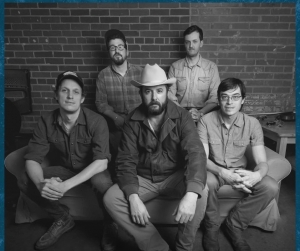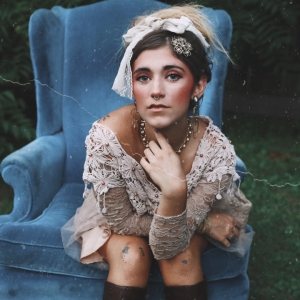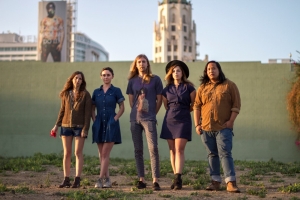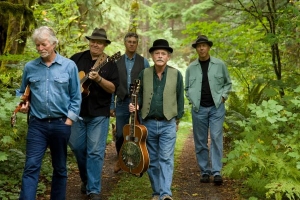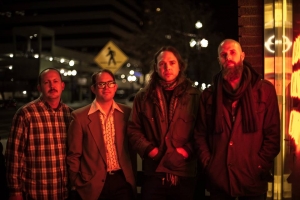Displaying items by tag: country
Town Mountain
Raw, soulful, and with plenty of swagger, Town Mountain has earned raves for their hard-driving sound, their in-house songwriting and the honky-tonk edge that permeates their exhilarating live performances, whether in a packed club or at a sold-out festival. The hearty base of Town Mountain's music is the first and second generation of bluegrass spiced with country, old school rock ‘n’ roll, and boogie-woogie. It's what else goes into the mix that brings it all to life both on stage and on record and reflects the group's wide-ranging influences – from the Grateful Dead's Jerry Garcia and the ethereal lyrics of Robert Hunter, to the honest, vintage country of Willie, Waylon, and Merle. The Bend Bulletin’s Brian McElhiney says Town Mountain, “has serious country and rock ’n’ roll DNA.” Town Mountain features guitarist and vocalist Robert Greer, banjoist Jesse Langlais, mandolinist Phil Barker, fiddler Bobby Britt, and Zach Smith on bass.
Town Mountain's latest album New Freedom Blues (October 2018) is their second consecutive album to debut in the top 10 on the Billboard Bluegrass Chart, and receive multiple worthy mentions by Rolling Stone, No Depression, and more. Full of new material and featuring several guest artists including Tyler Childers and Miles Miller (Sturgill Simpson, drummer), they prove they have staying power by regularly cranking out authentic hit albums. Which they intend on doing again when they go back into the studio this Spring (2021) to record their 6th full-length album of original material. The impression the band has made on fans is clear through their social media engagement, top-tier festival appearances, and Spotify streams (10+ million).
Sierra Ferrell
With her spellbinding voice and time-bending sound, Sierra Ferrell makes music that's as fantastically vagabond as the artist herself. Growing up in West Virginia, the singer/songwriter/multi-instrumentalist got her start belting out Shania Twain songs in a local bar at the age of seven, and left home in her early 20s to journey across the country with a troupe of wandering musicians. "I met all these homeless kids who were traveling all over the place and playing amazing old songs, and I wanted to be a part of that," says Ferrell, who played everywhere from truck stops to alleyways to freight train boxcars speeding down the railroad tracks. "The music they were making was so honest, so pure. It seemed important to bring that kind of music back, and it's been with me ever since."
After years of living in her van and busking on the streets of New Orleans and Seattle, Ferrell moved to Nashville and started landing gigs around town. Soon enough, her magnetic live show drew the attention of Rounder Records, who signed Ferrell in 2019. To date, she's enchanted audiences at major festivals like The Avett Brothers at the Beach, AmericanaFest, and Out on The Weekend, and also shared the stage with the likes of Trampled by Turtles, Parker Millsap, Charley Crockett, and The Reverend Peyton's Big Damn Band.
Produced by Gary Paczosa (Alison Krauss, Dwight Yoakam, Gillian Welch), Ferrell's debut singles for Rounder feature a stellar lineup of musicians, including country royalty like Chris Scruggs and her longtime collaborator Nathan Leath (a fiddle player she first met at the American Legion Post 82's Honky-Tonk Tuesday). Sprung from her self-described "country heart but a jazz mind," those tracks include "Why'd Ya Do It": a beguiling and bittersweet lament partly inspired by Ferrell's fascination with calypso and tango music. ("That song took me a few years to put together -- it's such a different vibe for me, and I'm ridiculously happy with the outcome," Ferrell notes.) And with its galloping rhythm and classic bluegrass storytelling -- as well as a guest appearance from Grammy Award-winner Sarah Jarosz on background vocals -- "Jeremiah" sweetly delivers what Ferrell dubs "a broken song, with a gleam of hope at the end."
Now at work on her full-length debut for Rounder, Ferrell delights in defying all convention in everything she creates. "I want my music to be like my mind is -- all over the place," she says. "I listen to everything from bluegrass to techno to goth metal, and it all inspires me in different ways that I try to incorporate into my songs and make people really feel something."
Facebook @sierraferrellmusic
Twitter @SierraFerrell_
Instagram @sierraelizabethferrell
The Wild Reeds
The Wild Reeds can be defined by one word: Harmony. However, the music is nearly indefinable. The sound from this LA based band fronted by Kinsey Lee, Mackenzie Howe and Sharon Silva dips in and out of multiple genres - some etherial folk, a hint of country twang and some rock and roll rhythm (from Nick Jones and Nick Phakpiseth), but it all comes back to the root of this band's power: the fact that Lee, Howe and Silva harmonize like triplets separated at birth.
Eilen Jewell
Saturday 5pm & Sunday 12pm
“Sometimes as darkly damaged as Lucinda Williams, at others as defiant and teasing as prime Peggy Lee and always authentically Americana in the Gillian Welch tradition…. She’s mighty good.” - Los Angeles Daily News
Marley's Ghost
Marley's Ghost is nothing less than a national treasure, the capable inheritors of the archetypal Americana blueprint drawn up by The Band. As the L.A. Weekly aptly put it, "This West Coast [group] deftly, and frequently daffily, dashes across decades of American music to create a sound that's steeped in tradition but never bogged down by traditionalism." These guys can sing and play anything with spot-on feel, from reggae (hence the double-entendre moniker) to blues to stone country, which is what they've been doing - to the ongoing delight of a fervent cult that includes many of their fellow musicians - throughout their first quarter century as a working unit.
"The band has always been eclectic, and that's one of the reasons we've stayed together for this long," Wheetman explains. "I've said this before, but instead of having to be in a Delta blues band, an a cappella singing group, a country band, a reggae band, and being a singer/songwriter, I'm in one band and we just do all that. It's very convenient."
Dan Wheetman (vocals, bass, rhythm guitar, fiddle, harmonica, banjo, Dobro, lap steel) came to the group after a long career during which he played in the '60s Simi Valley, Calif., teen rock group the Humane Society, Fresh Air (with Don Heffington), the Honky Tonk Swamis and '70s country-rockers Liberty, who spent years on the road with John Denver and Steve Martin. Danny's showmanship and unique sense of humor, combined with an uncommonly powerful and resonant baritone, provide the focal point for the group's upbeat performances.
Mike Phelan (vocals, lead guitars, fiddle, Dobro, bass, lap steel), who's been performing as a singer/player since he was knee high to a grasshopper, has lived all over the U.S., playing, recording and performing in many styles, including bluegrass, rock, folk and blues in countless bands. Phelan cites guitarists Steve Cropper, Eldon Shamblin, Doc Watson, Jimi Hendrix and B. B. King, and vocalists Tommy Duncan, Ralph Stanley and William Bell as major influences. Like Wheetman and Wilcox, he's also a deft and prolific songwriter.
Jon Wilcox (vocals, mandolin, rhythm guitar, guitar, bouzouki) has solo recordings on the Folk-Legacy, Sierra-Briar and Sage Arts labels and has toured internationally as a singer/songwriter and interpreter of traditional American and British Isles music. He's also intimately familiar with the groves of academe, having graduated from Stanford Law School and later teaching high school history.
Ed Littlefield Jr. (vocals, pedal steel guitar, Highland bagpipes, keyboards, mandolin, Dobro, lead guitar), a product of the Northern California folk scene, relocated to Washington State in the early 1970s. He toured extensively with the well-known Seattle Western swing band Lance Romance before founding Sage Arts, one of the Northwest's premier recording studios, where he functions as a producer and engineer. Littlefield is one of the most innovative of the new breed of pedal steel guitarists; among his influences, he counts Ian & Sylvia, Bob Dylan, Flatt & Scruggs, Hank Williams, Doc Watson, Ernest Tubb, the Grateful Dead, The Band and the Rolling Stones.
Jerry Fletcher (keys, accordion, vocal arranging), who's long the band's secret weapon and unofficial fifth Ghost, appearing on albums and gigs from the outset, became a fulltime member in 2006. A teen rock rival of Wheetman's and later his cohort in Liberty, Fletcher lays down a thoughtful groove that grounds the band and completes the musical puzzle.
Triggers & Slips
Triggers and Slips music is steeped in the psychology of relationships. Like so much great country music that came before, theirs originates in personal mistakes and stepped on hearts. While the band's music is a blend that's not quite country and not quite rock n' roll, and not quite alt-country either, fans of both types of music have come to love their sound.
Triggers & Slips is based out of Salt Lake City, Utah. They have spent the last two years playing local venues and national music festivals. Lead by singer/songwriter Morgan Snow, he incorporates insightful, poignant lyrics, with a powerful, and soulful voice reminiscent of traditional country music like Hank Williams, Johnny Cash, Waylon Jennings, and Willie Nelson, while pulling from other influences such as Pink Floyd, The Who, Alice in Chains, Pearl Jam, Blind Melon, and Nirvana.
Triggers & Slips started in living rooms, and campfires for close friends, and the occasional new stranger. The music and performance has developed into something that is every bit as powerful in small intimate venues as it is at larger venues such as national music festivals with Snow playing solo, or as a duo with multi-instrumentalist John Davis, who adds lap steel, lead guitar, tenor guitar, as well as sharing the singing duties, which blend well with Snow's simple vocal and instrumental style.
Triggers & Slips also plays as a full 5 piece band that brings people to their feet with their blend of rock, honky tonk country, and psychedelia. Their ability to play to any crowd, and any venue, has provided them with opportunities to share their music to an eclectic group of people from events catered towards anything from EDM, jam bands, and country fans, to small coffee shops, and everything in-between.
OFOAM presents Eilen Jewell 2011 at Jefferson Hall
Saturday, November 3, at 7:00pm the Eilen Jewell Band returns to O-Town for a special night of music at Jefferson Hall! After wowing the Ogden Music Festival crowd in 2010, Eilen Jewell released "Queen of the Minor Key" in 2011 on Signature Sounds.
Jefferson Hall is at 607 26th Street in Ogden, UT
Click on "Tickets" above to buy your tickets online here for the advance price of $15. $20 at the door, Kids 16 and under get in free
It is the battered cassette jammed in the tape deck of the getaway car, the music Ida Lupino cues up on the roadhouse jukebox as she counts the till after close. This is Queen of the Minor Key by Eilen Jewell, a smart cookie with a heart of burnished gold and enough stories to keep even the rowdiest crowd hanging on her every word. Though its long shadows and dark corners make her kingdom feel intimate, her sovereign domain stretches as far as the imagination. Its denizens seek refuge in padded rooms, abandoned automobiles... and strong spirits. They defend their territory by any means necessary: weird voodoo, sawed-off shotguns, broken bottles.
But beware, savvy observer. There is more to Eilen Jewell than meets the ear. Do not confuse the singer and her songs. The drama and darkness that give Queen of the Minor Key its gritty texture are in short supply in the Boston-based songwriter's personal life. And in a curious twist, these fourteen originals actually took shape in a sunny, idyllic location that contrasts strikingly with the album's moody, film noir atmosphere.
In August 2010, Jewell headed to a tiny cabin in the mountains of Idaho. Although her clan hails from the Gem State, this was no comfy retreat at the family fold. Her temporary abode had no running water or electricity, and sat at the end of a winding dirt road. Wild elk would graze in the surrounding meadows while she worked. When it was time to unwind, she availed herself of a nearby hot springs. A dilapidated truck she found on the property even made its way into the album artwork.
She had no set game plan, and her sole objective for the new material was refreshingly modest (or incredibly daunting, depending on your point of view). "My goal as a songwriter is to always improve," she demurs. "Every time I make a record, I want it to be even more real, more heartfelt, than the one before it. I want the slow songs to be slower and the fast songs to be faster." Drawing on a connoisseur's love of roots music and a writer's eye for detail, Jewell fashions her musical vignettes with impressive economy. Each turn of phrase and chord change is executed with an élan that belies the measured precision behind it.
Jewell is wary of repeating previous success by following formulae. "But I also don't want to change things just for the sake of changing them," she adds. Never underestimate the public's ability to recognize calculation masquerading as inspiration. "You always want to ride the creative process to new territory, without being overwhelmingly novel."
Towards that end, she experimented with dark humor in the new material. The title tune takes inspiration from a poke someone made about her harmonic preferences. "I decided to run with that and adopt the moniker, even if it started off as a nickname that wasn't necessarily intended to be flattering." "Bang Bang Bang" eschews the cliché of Cupid as a rosy-cheeked cherub ("he's more reckless and violent than that"), and replaces his petite bow-and-arrow with a gun show six-gauge, plus a laughing disregard for such trivial concerns as aim.
Queen of the Minor Key is also the first Eilen Jewell album to feature a significant number of guest players, even as she continues to work in close consort with her longtime trio of drummer Jason Beek, guitarist Jerry Miller, and upright bassist Johnny Sciascia. Zoe Muth and Big Sandy (of Big Sandy & His Fly-Rite Boys) both contribute vocals. "I was writing the songs with them in mind—if I could work up the courage to ask them—so I was really honored that they agreed to sing with me." Further augmenting the sound are Rich Dubois on fiddle, David Sholl on tenor and baritone saxophones, and Tom West on organ. The arrangements, Jewell insists, occurred organically as the music was fleshed out in the studio; the songs tell her where they want to go. "We don't really think it out that much."
Since her official 2006 debut, Boundary County, Jewell has surveyed a wide range of traditional musical styles, from the folk and jug band leanings of her early recordings, through an album-length homage to Loretta Lynn and the country gospel of her work with The Sacred Shakers, right up to 2009's Sea of Tears, which bristled with the electricity of '60s UK garage rock and Chicago blues. Queen of the Minor Key draws on everything from classic country (the fiddle-driven "Reckless") to early R&B (the shuffling "Hooked"), with an emphasis on sounds from the seamier side of the tracks. With dirty sax riffs and low-slung guitars, the instrumentals that bookend the album—"Radio City" and "Kalimotxo"—evoke the bump-and-grind exotica of vintage Southern California suburban saloons. Yet on the flipside, Jewell imbues slow, jazzy numbers like "I Remember You" and "Only One" with torch and tenacity that linger long past last call.
Eilen Jewell is the Queen of the Minor Key. Sad songs are her wealth and finery. Lend her your ears, and you will quickly hear why her humble subjects admire and adore her more with each passing year.

